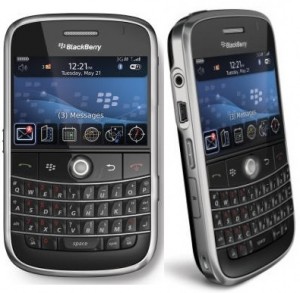
The Emirates’ looming crackdown on BlackBerry services will extend to foreign visitors, its telecom regulator said Monday, putting the government’s concerns over the handheld devices in direct conflict with its aim to become a business and tourism haven.
Travelers to Dubai and the important oil industry center of Abu Dhabi will — like local residents — have to do without BlackBerry e-mail, messaging and Web services starting in October, when the ban is scheduled to take effect.
It could also leave time-pressed business travelers hurrying through the region’s busiest airport in Dubai, many of them changing planes to destinations elsewhere, without access to the Web or their e-mail.
“I think it’s a very big step back. All developed countries in the world have it. Why should we not?” said Emirati BlackBerry user Maisoon al-Iskandarani, 24, who works at an international bank in Dubai. “How are you going to stay in touch with your clients and colleagues?”
Device maker Research in Motion Ltd. has so far declined to comment on the plan to suspend the services, which Emirati authorities announced Sunday.
The UAE contends some BlackBerry features operate outside the country’s laws, “causing judicial, social and national security concerns.” At the heart of their concerns is the way the BlackBerry handles data, which is encrypted and routed through RIM’s servers overseas, where it cannot be monitored for illegal activity.
Critics of the crackdown say it is also a way for the country’s conservative government to further control content they deem politically or morally objectionable. The smart phones enjoy a following not only among the region’s professionals, but also among tech-savvy youth who see their relatively secure communication channels as a way to avoid unwanted government attention.
The Telecommunication Regulatory Authority had left the question of phones run by foreign operators unanswered in announcing the ban, which is due to take effect Oct. 11.
But in an e-mailed response to AP questions Monday, the regulator said the service suspension would apply to all users in the country, including visitors using roaming services on foreign BlackBerry phones.
“Roaming for BlackBerry Messenger, BlackBerry e-mail and BlackBerry Web browsing will also be suspended,” the TRA said in its unsigned e-mail. “They won’t be able to use the mentioned services in (the) UAE as it’s suspended (in) the country.”
That would put BlackBerry service out of reach for business travelers and others passing through the Mideast’s busiest airport in Dubai, which averages about 100,000 passengers a day.
Dubai is a major commercial center, hosting the Mideast’s biggest port, and has emerged as the region’s financial capital and a popular tourist destination.
Its image as an easy place to do business has been tarnished, however, by a credit crisis that has left the emirate more than $100 billion in debt. Residents fear the BlackBerry crackdown won’t help.
“Dubai as it is doesn’t have a good reputation right now. Do you really want to add to that, so people say ‘even technology-wise they’re behind?’” al-Iskandarani said. “If anything, they should bring in extra services.”
The UAE’s other six emirates increasingly rely on foreign visitors too. The UAE federation’s capital Abu Dhabi, while less well-known abroad than its flashier neighbor, is building ties with multinational firms, actively promoting tourism and investing heavily in its own aviation sector.
Smaller emirates, such as Ras al-Khaimah in the north of the country, are also trying to entice foreign businesses to set up shop.
The UAE has singled out BlackBerry devices for scrutiny before.
Last year, RIM criticized a directive by the UAE state-owned mobile operator Etisalat telling the company’s BlackBerry users to install software described as a service upgrade. Tests showed the download actually installed spy software on users’ phones that could allow authorities to access private information stored on the handsets. It strongly distanced itself from Etisalat’s decision and told users how to remove the software.
The TRA says there are 500,000 BlackBerry subscribers in the UAE.
Telecommunication officials in Saudi Arabia have also said they are planning to curtail use of the BlackBerry messaging service, but not other services on the phones. Other countries, including India and the Gulf state of Bahrain, have also raised concerns about BlackBerry messaging features, but have not blocked them outright. AP

Leave a Reply
You must be logged in to post a comment.